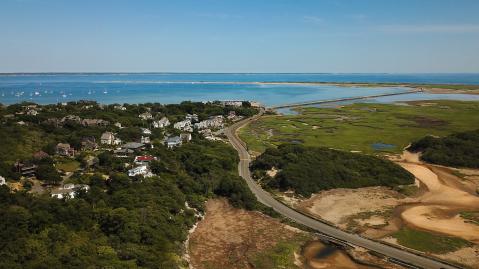Image

Copyright
© Michael Baccin / Unsplash
Lightbox Image (duplicate of Image)
Body (only for migrated news)
The Massachusetts Senate is expected to debate a package of legislation focused on addressing climate change at the end of January. Split into three bills, the package forms a comprehensive plan to enshrine a statewide net-zero emissions goal by 2050 in law and establish a policy framework to achieve it.
The bills are titled ‘An Act Setting Next Generation Climate Policy (S. 2477); An Act Relative to Energy Savings Efficiency (S. 2478); and An Act to Accelerate the Transition of Cars, Trucks, and Buses to Carbon-Free Power (S. 2476). Major components include carbon-pricing mechanisms for transportation, industry, and residential, public, and commercial buildings; a series of five-year greenhouse gas emissions reduction requirements that ramp up to net-zero emissions in 2050; the establishment of an independent climate policy commission; and an electric public transit bus fleet by 2040.
The carbon pricing and net-zero emissions are encompassed in An Act Setting Next-Generation Climate Policy (Bill S. 2477). The bill would put Massachusetts on track to price emissions across the economy, mandating a price on transportation by 2022, a price on commercial and public buildings as well as industry by 2025, and a price on residential buildings by 2030. The bill would also place other sources of emissions, including solid waste, agriculture, and natural gas distribution and service, under state-wide limits, and would require plans to achieve those targets.
The bill does not mandate bringing the transportation, industry, and buildings sectors into the state’s existing carbon pricing mechanisms. Instead, it enables the Massachusetts governor and the to-be-established independent climate policy commission to choose an appropriate market-based carbon reduction mechanism, whether from potential systems such as the Transportation and Climate Initiative, existing systems such as the Regional Greenhouse Gas Initiative (RGGI) or Massachusetts’ standalone system, or establishing a different system entirely. Massachusetts participates in RGGI, which covers emissions from large fossil-fuel power plants in the state, and has established a standalone ETS for the power sector to complement RGGI and ensure the state achieves its mandatory mitigation targets (see ICAP’s Massachusetts factsheet).
This legislative package was introduced in the Massachusetts Senate shortly after Governor Charlie Baker’s State of the Commonwealth address, in which he committed Massachusetts to achieving net-zero GHG emissions by 2050. The Massachusetts House of Representatives has also released a bill, titled An Act to Create a 2050 Roadmap to a Clean and Thriving Commonwealth (H.832), with a goal of attaining net-zero emissions by 2050. The bill also calls for interim emissions limits in 2030 and 2040 that can be attained by any market-based compliance mechanism or other form of carbon pricing but does not specifically indicate how such tools would be used.
It is expected that the two bills would be reconciled through a conference committee, in which a final compromise bill would be reported to the House and Senate for a final vote of acceptance in each chamber. The Senate is expected to hear arguments on all three bills on 30 January 2020.
ETS Jurisdiction

